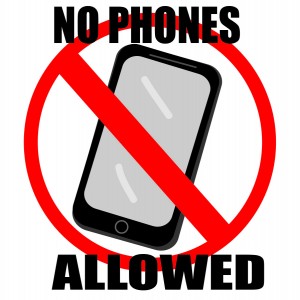By Jay Carroll
Staff Writer
At the beginning of each school year, students go to their classes for the first time to meet their new teachers and receive a syllabus. At this time, students are told each teacher’s cell phone policy – some lackadaisical and others extremely strict.
Cell phones are a part of students’ lives. If you walk through the halls each passing period, you will see students navigating seas of people while trying to text friends or look at a social media site. I am guilty of doing the same. When a teacher bans use of phones in that class for the whole year, they are inviting students to try to use their phones without getting caught. They do not realize that they are taking away a part of teenagers’ lives.
I recently saw someone staring at his phone trip down the stairs. This is how bad it has gotten.
Overuse of cell phones is a bad habit, I will admit. But whenever a teacher sees a student typing they automatically assume they are texting. Yet I have taken notes on my phone while paying complete attention to my teachers. Use of cell phones in class is not always a bad thing. Phones are used for information resources and other educational purposes. Wikipedia and Google can be valuable to look up information, yet cell phones are still banned in some classes.
I was once using Wikipedia to look up information about a person. When my teacher came over and got angry at me for having my phone out, the girl sitting straight across from me was texting. My teacher even looked down at her texting and right after harping at me – and he said nothing. I have had teachers who have been inconsistent in their policies. In one instance, I was using my cell phone to find biographical information about someone while one of my classmates was texting. I was the only one who got in trouble. Inconsistent policies lead to confusion among the students and a harsh double-standard.
A study by Buzzle shows that 65 percent of students in schools with a zero-tolerance policy still use their cell phones. Cell phones are kind of like drugs. Drugs are illegal, but a lot of people still use them. It is the same principle with cell phones being banned in schools – a lot of people use them regardless.
Another article posted by PBS mentions how cell phones are being used more and more by students for educational purposes. Teachers are scared of cell phones because they have been so strict about the usage of cell phones in the past. They are scared of changing the way that education has worked for centuries. Technology is the future. Teachers and administrators need to let go of their tendency to eliminate technology from the educational process and move on to the 21st century.
Even CHS has started to transform into a technology-friendly school. Whether it is flipped-classroom teaching models, cell phones or laptops, technology is becoming more popular in this school – and this shift needs to continue. Even the library has started to go digital, providing students the opportunity to check-out audio books through their iPhone or tablet.
We are heading in the right direction, in Brian Rohloff’s Pre-AP World History class; he would allow us to use iTouch, iPhones and other forms of technology to look up information about subjects in class. And in Amy Wilkinson’s Academy and senior English teachers class, students can read books on their phones and look up desired information. The school is heading down the right path with the use of cell phones, but some teachers are still just too strict about cell phones.
That is why it is still a little crazy that some teachers, not all, are still so strict about the usage of cell phones in their classroom. I understand the dislike for texting during a lecture, but unless you actually know whether a student is texting as opposed to taking notes or setting homework reminders for the night, do not yell at students because they are simply utilizing technology to enhance their learning potential.









